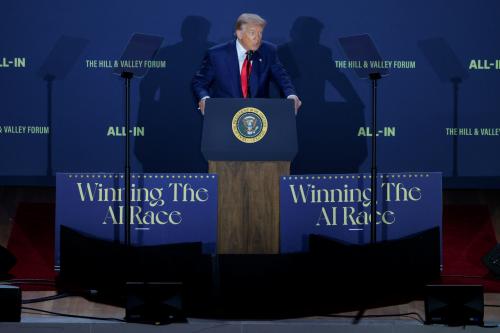Since Saddam Hussein’s capture two weeks ago, every serious Democrat running for president has gone out of his way to flex his foreign policy muscle. And, almost without exception, each candidate has made securing nuclear materials a key part of his vision. Citing the Bush administration’s perceived neglect of the Nunn-Lugar Cooperative Threat Reduction (CTR) programs, which spend roughly $1 billion annually securing nuclear, chemical, and biological weapons in the former Soviet Union, the candidates have variously pledged to double, triple, or even sextuple the fund.
The critique of Bush makes both substantive and political sense. By any measure, the president has let a dangerous situation, one in which the materials for nuclear weapons might be stolen by terrorists or rogues, fester, without any substantial new post-September 11 commitment. Moreover, as James Carville’s Democracy Corps wrote in a September memo, three-fourths of Americans react positively to a Democratic candidate who charges the administration with neglecting to secure loose nukes and who promises to do better.
Still, one can’t help but ask: What would all the extra billions do? The answer, unfortunately, is not much–at least not without a dramatic political effort behind them. Right now, critical Nunn-Lugar spending is blocked mainly by diplomatic and institutional barriers, not by penny-pinching policymakers. And fixing that problem doesn’t just require money. It requires leadership.
The first challenge is to forge new relationships with countries so far passed over by the Nunn-Lugar program. The most obvious candidate on this list is Pakistan: There is little reason to trust President Pervez Musharraf when he insists that his nuclear technology is secure, and there is even less reason to trust that his leadership itself is stable, especially after two assassination attempts in the last few weeks alone.
But the reason the United States has not yet taken major steps to secure the Pakistani arsenal is not money; it’s a lack of diplomatic creativity. Time and again, American emissaries have offered to physically protect Pakistani weapons–as a former Pakistani ambassador to Washington described it, the United States had offered to baby-sit their bombs. Not only did the Pakistanis find such offers insulting, they also found them dangerous, as they would have required giving Americans access to Pakistan’s secrecy-shrouded arsenal. A wiser American administration would shift tacks with Pakistan and develop ways to enable the Pakistanis to secure their arsenal themselves. It would also be more careful to assuage the Pakistanis’ egos.
Political effort by an American administration could also bolster the U.S.-Russian Nunn-Lugar programs in important ways. Some of what’s needed is simple. For example, bureaucratic intransigence in Russia often leads managers to refuse to move their vulnerable nuclear materials stocks to more secure locations. By pressing President Putin to lean on those bureaucracies, an American leader could help move Nunn-Lugar forward.
Other necessary steps are of course more diplomatically complicated and strategically sensitive. The United States, for example, would like to aid Russia in comprehensively securing its stockpiles of actual nuclear weapons, something that’s not done at present. American policymakers naturally demand accountability. But the Russians refuse, arguing that allowing American access to sensitive Russian areas would deeply compromise Russian security.
Most observers agree that, to break this logjam, the United States will have to offer some sort of reciprocal access to its own sensitive facilities. But the Bush administration has apparently concluded that properly securing Russia’s stockpiles is not worth paying this price. A wise Democratic candidate would pledge to act differently.
Presidential leadership in moving Nunn-Lugar forward is not only necessary abroad–it’s also desperately needed in Washington, where conservative members of Congress have blocked efforts to enhance Nunn-Lugar. Indeed, even when the president has supported a new effort, such as the expansion of Nunn-Lugar beyond the former Soviet Union, the House has often been successful in beating it back. House conservatives have also placed severe constraints on the president’s flexibility in implementing the Nunn-Lugar program, leading to major delays in executing important initiatives.
The Bush White House has expressed opposition to such congressional tactics, but it has hardly been aggressive in lobbying Congress to change course. A Democratic administration would have even more trouble with a likely Republican Congress than President Bush does now. Still, a future Democratic president would only help himself by announcing on the campaign trail that he won’t let Congress obstruct critical national security efforts.
So far, the Democratic candidates have largely ignored these problems, preferring to focus instead on simple-to-understand budget figures. In doing that, they’re missing the weightier and more relevant critique of the president’s record. The Bush administration hasn’t just neglected to spend enough money on loose nukes; it’s mishandled the diplomatic relationships that would ensure that the money got spent wisely. That point fits perfectly with Democrats’ broader critique of the administration’s record on foreign policy, and they should be lining up to make it.
The Brookings Institution is committed to quality, independence, and impact.
We are supported by a diverse array of funders. In line with our values and policies, each Brookings publication represents the sole views of its author(s).



Commentary
Diplomacy, Not Just Dollars, For Loose Nukes
December 29, 2003